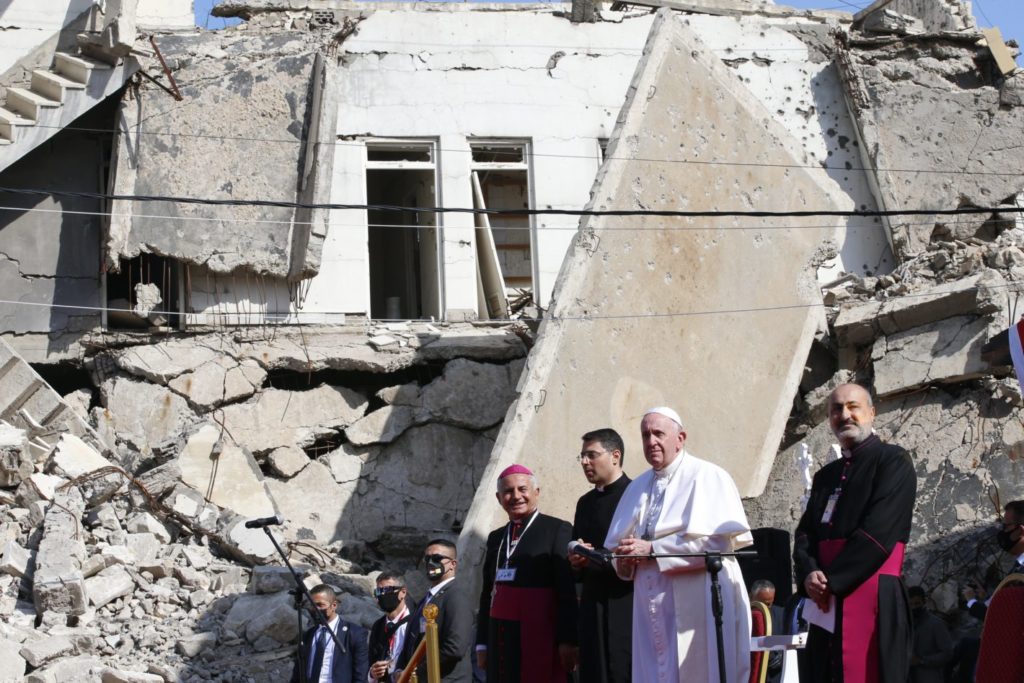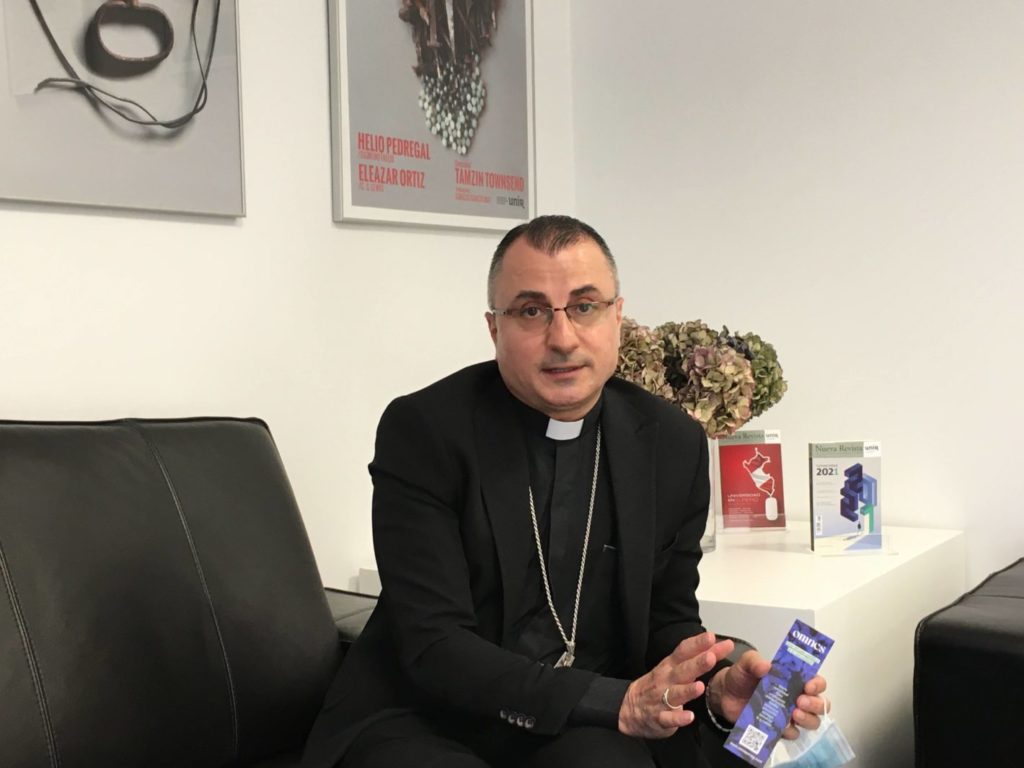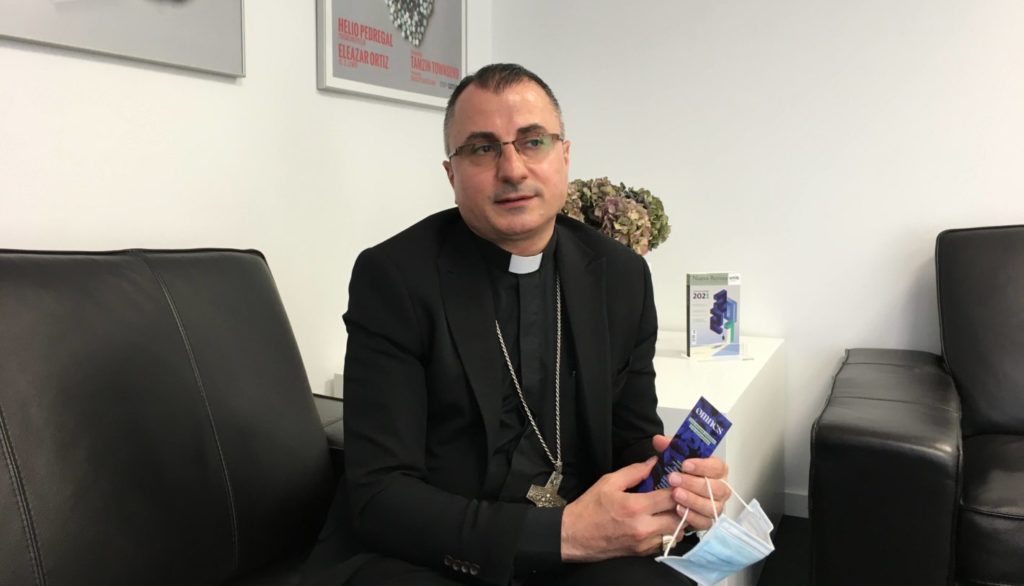In an office on the fifth floor of a building in a business district of Madrid, Monsignor Robert Jarjis, Auxiliary Patriarch of Babylon of the Chaldeans of the Chaldean Church, receives Omnes for a long time to talk about the recent and historic trip of Pope Francis to Iraq, as well as other issues, including the reason for his visit to Spain.
Msgr. Robert Jarjis was born in Baghdad on October 23, 1973. He studied veterinary medicine at the University of Baghdad, obtaining a license and a master's degree. He entered the patriarchal seminary of Baghdad and studied at the Babel College. He was then sent to Rome, to the Collegio Urbano, as a seminarian, to continue his education at the Pontifical Urban University and was ordained a priest in Rome on April 27, 2008 by Pope Benedict XVI.
He subsequently studied at the Pontifical Biblical Institute and obtained a degree in Biblical Theology in 2001. After returning to Baghdad, he was pastor for 7 years of the parish of St. Mary of the Assumption in the district of Mansour in the capital. Since a few months ago, he was pastor of St. Joseph Cathedral; he has been a local collaborator of the Apostolic Nunciature for some years.
He speaks Arabic, Italian, Syriac and knows English. Conversation is in Italian.
Msgr. Jarjis, regarding the historic visit of the Pope, knowing that it was a desire of the last Pontiffs, could you tell us how the trip was conceived and how it was carried out?
I remember very well when Pope St. John Paul II wanted to come to Iraq in the year 2000, on the Jubilee trip. At that time there were some difficulties and challenges that hindered the Pope from making the trip as he wanted at that time. He wanted to make a journey like Abraham, from Ur, a pilgrimage. But because of these obstacles and challenges, which had to do in part with the ruling regime that existed in Iraq at that time, Pope John Paul II was not able to make that trip.
So there remained a desire in the heart of the Pope, both of John Paul II and of those who followed him. That is why at that time there was a sadness among the Christians of Iraq, because this desire of Pope John Paul II could not be fulfilled. A meeting was held, in a certain sense, a "journey" in the Paul VI Hall.
This desire has been faced during all these years, and just this year the time has come to do it, "the hour has come", as the biblical text says. The time has come to carry out this desire. We can never say that it was an easy matter. Because the challenges were present on both sides, on the part of Pope Francis, on the part of the Vatican, on the part of the Church and on the part of the government. Perhaps some did not want this trip to take place. Maybe, I insist, maybe there was someone who did not want it. Because we have no documents on the matter. But the challenges were abundant, either from the Church, from the Vatican, or from the Iraqi government.
There were many challenges to the trip, both from the Church and from the Iraqi government. "Perhaps" there were some who did not want this trip to take place.
Monsignor Robert JarjisAuxiliary Patriarch of Babylon of the Chaldeans, Baghdad
I personally knew the plan of the trip before it was published, at a certain moment, as an auxiliary of the Patriarchate. I was personally asked by the Patriarch, Cardinal Louis Raphaël I Sako; he told me of the Pope's desire to travel to Iraq. Cardinal Sako is a person of abundant and very good relations, both inside Iraq and outside the country. These good relations have driven this desire for the trip to come to fruition. Without these relationships, this "baby" would not have been born, it would have remained in the womb, in the mind and heart of the Pope. When we learned from Patriarch Cardinal Sako - Patriarch of the Chaldean Church worldwide - and from the Nuncio, Monsignor Mitja Leskovar the desire to carry it out this year, we created a committee to work on the visit immediately. This committee started working in November and from then on everything has been moving forward.
We already know how the visit unfolded afterwards, but how was the reception of the announcement of the Pope's visit to the country?
There was a date to announce the visit, and because of these challenges that were there and that we have talked about, the announcement date was delayed. We were expecting this date, because from the moment it is announced, the visitation is on a 90%. But if it is not announced, it remains a wish, but the "baby" is not born.

So, at the time the announcement was delayed, we were a little scared. There was some uncertainty. But we thank the Lord, the work of everyone, of the Church and of the Iraqi government, because in the end everything went ahead. Also, because it was the first time in history that a Pope visited Iraq. We had no experience. We are not in Jordan, we are not in Lebanon, we are not in Egypt, where the Pope has already been.
At the time the announcement of the travel date was delayed, we were a bit scared. There was some uncertainty. But we thank the Lord, the work of everyone, the Church and the Iraqi government, because in the end everything went ahead.
Monsignor Robert JarjisAuxiliary Patriarch of Babylon of the Chaldeans, Baghdad
In addition, 2020 was a very complicated year, due to the COVID pandemic. And these problems added to the challenges already present. That is why the announcement has been a "gospel", good news.
The reactions have been totally positive, both for Catholics and for the rest of the Iraqi people and the whole world. How is the situation now among the religions and among the inhabitants of the country after the trip?
Iraq is a country that yearns for peace. Iraqis are tired of wars. Because it is a country that has lived through and experienced many wars, many types of wars: wars against other countries, civil wars, wars between families and even within families. So war has become a daily occurrence for Iraqis.
Peace is therefore a much desired and clean "water" for Iraq. For four days Iraq has experienced a miracle of peace. A very strange one. In a meeting I explained that all Iraq breathed clean air during those days. It was the first time since 2003 that such a clean air was breathed.
This act of the Holy Father, who is a human being but filled with the Holy Spirit, is a divine touch. When the divine touches you, it makes you live in peace, it makes you live in a joyful way. It does not eliminate the problems, the difficulties, of course. They remain, but in the midst of the problems, you live in peace. This is the divine touch. Iraq has experienced a touch of peace that is not earthly.
For four days Iraq has lived a miracle of peace. Not since 2003 has there been such pure air in Iraq.
Monsignor Robert JarjisAuxiliary Patriarch of Babylon of the Chaldeans, Baghdad
When the Pope visited Iraq, you have experienced this feeling, the pure desire of everybody and the unity of everybody to make this trip happen. Maybe, maybe, maybe, maybe, three times maybe, I mean, they received some call to avoid the trip.
Let us remember the attack a few days before the arrival of the Holy Father, which killed poor people, people who work every day to earn their daily wages. To buy vegetables, not even meat, only vegetables, to feed their families. They have been killed. This attack, perhaps, has been to prevent the trip of the Holy Father.
However, the divine touch had its plan. That this people could live a little peace.
What are the projects in Iraq now? What is the legacy of the Holy Father for the coming years?
What does an Iraqi say about the Pope's visit? About the Pope's visit, he says I hope he comes back. Because the streets have been cleaned, happiness is present. The people are united. This did not exist. Jesus speaks. The devil's kingdom is divided and does not remain. When it is united, it remains. Iraq has been united. Everything. Christians, Muslims, all followed the visit of the Holy Father. All.
I was also responsible for the liturgical ceremonies. When the Pope came to the cathedral; you can see in YouTube videos, which have been widely spread on the net; people from the surrounding area would come out of their houses and approach to greet the Pope, almost all of them Muslims or non-Christians. The Pope would pass by and they would greet him "eccolo, eccolo, benvenuto Papa!". They spoke in Italian. They were Arab people. It is a tremendous thing. A particular touch.
The people need a face of peace like that of the Holy Father. They are tired of the faces of war. I am tired too, being an Iraqi.
Entering into another question, Msgr. Jarjis, what was the reason for your visit to Spain?
This question is very interesting. Because of immigration, which we have largely in Iraq, as the Chaldean Church, I am the Auxiliary of the Patriarchate of the Chaldean Church for Educational Affairs. And we have created an Institute for Biblical and Ancient Languages Studies. Biblical and Mesopotamian Languages.
And we not only want to reach out to our faithful who are in Iraq, but also to the faithful who are all over the world. This brings the churches together again. Using the means that exist now. St. Paul used the medium that was used in his time. If St. Paul had had the Internet, Facebook or WhatsApp, he would have used them. St. Paul would have sent the Letter to the Corinthians through Facebook, Instagram or Twitter.

But the means he had were letters. And that was what he did, writing letters with the fire of his heart. To proclaim the name of Jesus, to reach everyone and unite everyone. Therefore, we, as children of this great herald of the name of Jesus, have sought the fastest means to transmit this and unite our church that is scattered throughout the world.
St. Paul if he had lived today would have sent the Letter to the Corinthians through Facebook, Instagram, WhatsApp or Twitter. The medium he had then was letters.
Monsignor Robert JarjisAuxiliary Patriarch of Babylon of the Chaldeans, Baghdad
The challenges are many. First, because we didn't want to create something without a clear and concrete objective in the future. We could have done something simple and that was it. But we didn't. Our teachers have already started before the pandemic. They are all from the Arab world. Professors from the PhD, from the master's degree in the Bible. We have already taken the academic steps.
The second step, we have started to register Iraqi students, from different provinces; also students from the United States and Canada. From three countries. The second year we started with 46 people. Students from Europe, from Sweden, from Australia, from other states in the United States, from Turkey, immigrants in Turkey, and so on.
This is our project. It requires support. Economic support but also recognition from other foreign universities, which is fundamental. Through an "angel", a Spanish priest, Father José Rapallo, who takes care of the Spanish military inside Iraq, we have made great progress. We met him during the visit of the Holy Father. And we talked about this project. And from there we have made contact with two universities: UNIR University and the Faculty of San Dámaso.
So we have been in contact with them and we have had meetings so that they can help us in the technical part. Thanks also to Cardinal Osoro and Cardinal Omella, etc. We have spoken as brothers.
The third economic part, we hope to find support and sponsors that will allow us to carry out the project.
Before the pandemic, we had started a catechetical institute in several cities. In Erbil, in Baghdad. But it is an Institute that covers a lot but not very deep. The Institute we are promoting covers a specialized subject. So let us hope that it will succeed.







